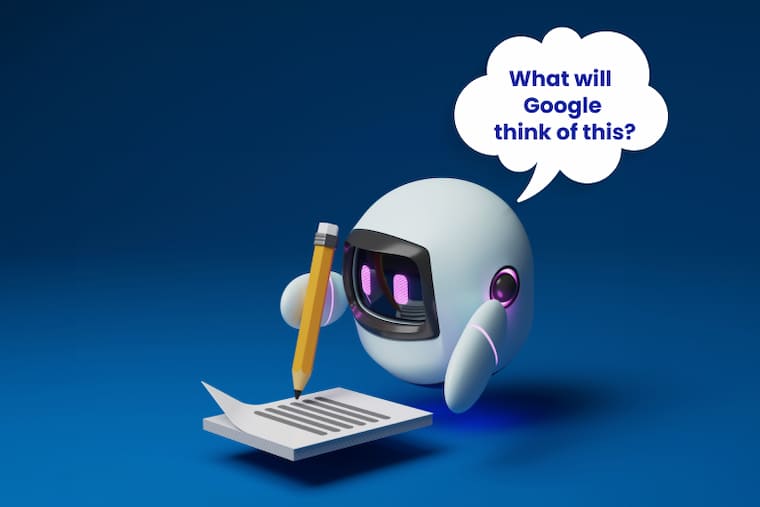Have you been noticing how AI chatbots are advancing at a stunning pace? They can now hold conversations, answer questions, and even generate lengthy passages of text. As Artificial intelligence advances, its ability to generate human-quality text is steadily improving. It is thereby sparking questions and debates about its role in the future of writing. One key player in this discussion is Google, a company actively researching and developing AI writing technology. But what exactly is Google Treats AI Content? What does this mean for writers, readers, and, most importantly, Google?
The Advancement Of AI Writing
AI writing utilizes machine learning algorithms trained on vast datasets of text and code. These algorithms can then generate human-like text, translate languages, write different kinds of creative content, and even answer your questions in an informative way.
For Example: Google AI Chatbot, Gemini.
Google’s Take On AI Writing

Google recognizes the potential of AI writing while emphasizing responsible and ethical use. Google’s AI content policy isn’t against AI writing, but rather emphasizes the responsible use of AI to produce high-quality, people-first content.
Few Points To Remember
- Focus on Quality & Value: Google prioritizes content that is high-quality, informative, and valuable to users. Whether human-written or AI-generated, content should demonstrate expertise, experience, authoritativeness, and trustworthiness (E-E-A-T).
- Transparency & Accuracy: Google encourages transparency about the use of AI in content creation. Factual accuracy and up-to-date information are crucial, and AI limitations in these areas should be acknowledged.
- Responsible Use without Manipulation: Google prohibits the use of AI for manipulating search engine rankings. Content primarily focused on keywords and ranking algorithms, rather than genuine information, is considered spam and will be penalized.
- Humans in the Loop: Google emphasizes the importance of human oversight and editing when using AI writing tools. The final product should reflect human understanding, judgment, and creativity.
Now that we know about Google’s take on AI writing, let’s see where AI excels and where it lacks.
Benefits & Challenges Of AI Writing

While Google stresses the importance of responsible utilization, AI writing undeniably presents numerous benefits:
- Efficiency: AI can generate content faster, freeing humans for higher-level tasks like strategy and editing.
- Personalization: AI can tailor content to specific audiences and needs.
- Overcoming Writer’s Block: AI can spark ideas and overcome creative roadblocks.
- Accessibility: AI tools can help overcome language barriers and writing difficulties.
| Can Google detect AI generated content?
Google can detect AI-written content using language patterns, logic checks, and source analysis. But the focus is on quality, not AI itself. Well-written, informative content, even if AI-assisted, is fine. The key is to prioritize users and avoid manipulative tactics. As AI writing evolves, detection methods do too. |
However, it comes with limitations too:
- Creativity & Style: AI writing can struggle with originality, nuance, and unique voice.
- Emotional Intelligence & Empathy: AI often lacks the human touch, making it difficult to connect with readers on an emotional level.
- Bias & Factual Errors: AI models are trained on vast datasets, which can reflect biases and factual inaccuracies.
- Ethical Considerations: The use of AI raises concerns about job displacement and potential misuse for misinformation.
So, What Does This Mean for You?
As a writer, reader, or user, knowing how Google approaches AI writing can help you steer through this new AI field effectively.

- Writers: Start utilizing AI as a helpful tool. Use it to overcome writer’s block, generate ideas, or personalize your writing style. However, always fact-check, edit, and ensure your own voice is heard.
- Readers: Be critical of AI-generated content. Look for signs of human oversight and editing, and question the source and purpose of the content.
- Users: Take advantage of AI-powered writing tools that enhance your experience, but remember that human creativity and expertise remain irreplaceable.
The future of writing lies in the collaboration of humans and machines.
Google, with its commitment to user experience and quality content, will play a vital role in shaping the future of writing. AI will transform content creation and personalization, but quality, accuracy and judgment will depend on human-machine collaboration.
AI is a tool, it’s only as effective as the human wielding it. Wield it wisely!
Frequently Asked Questions
Q. How does Google treat AI-generated content in terms of search rankings?
A. Google doesn’t penalize AI content itself, but prioritizes high-quality content regardless of origin. Focus on creating valuable, informative content using AI responsibly, avoiding manipulative tactics.
Q. Does AI-generated content face any specific challenges in terms of SEO?
A. AI-generated content can struggle with SEO due to potential lack of originality, creativity, and factual accuracy, which search engines like Google prioritize.
Q. Can AI content be penalized by Google for violating SEO guidelines?
A. Google doesn’t penalize AI content itself, but assesses it like any other content. However, AI-generated content that’s low-quality, irrelevant, or spammy can still get penalized if it violates Google’s SEO guidelines.
Q. Does Google prioritize content based on its source, whether AI-generated or human-created?
A. Google prioritizes content based on its quality and relevance to the user, not who created it. AI content can rank highly if it demonstrates expertise, trustworthiness, and helpfulness, especially for sensitive topics.
Q. Are there any specific recommendations for optimizing AI-generated content for better search performance?
A. While AI can help create content, search engines reward high-quality, human-edited information. Focus on clarity, relevance, and originality, and use AI tools for keyword suggestions, readability analysis, and audience insights.




